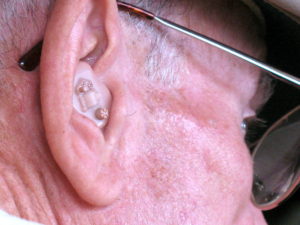
Age-related hearing loss is one of the most common health disorders of aging, affecting two-thirds of those over age 70. While hearing loss previously had been linked to higher rates of cognitive decline, a new study finds that this decline may start much earlier than previously thought.
Researchers at Columbia University found that even the earliest stage of hearing loss — when hearing is still considered normal — also is linked to loss of cognitive function.
Prior research has only examined people already diagnosed with hearing loss, defined as the inability to hear sounds under 25 decibels (dB), according to Justin S. Golub, M.D., assistant professor of otolaryngology-head and neck surgery at Columbia University College of Physicians and Surgeons.
“Physicians in this field have used 25 dB — about the loudness of a whisper — to define the border between normal hearing and mild hearing loss in adults, but this level is arbitrary,” Golub said. “It has been assumed that cognitive impairment wouldn’t begin until people passed this threshold. But no one looked at whether this was true.”
Any Hearing Loss May Be Cause for Concern
The researchers looked at data from 6,451 adults (average age 59) enrolled in two ethnically diverse epidemiologic studies (Hispanic Community Health Study [HCHS], and the National Health and Nutrition Examination Study [NHANES)] Hearing and cognitive testing was performed as part of these studies.
Golub and colleagues found that for every 10 dB decrease in hearing, there was a significant decrease in cognitive ability, a pattern seen across the entire spectrum of hearing. The most significant decline in cognitive ability occurred in those whose hearing was just starting to become impaired, only 10 dB off the perfect mark.
“Most people with hearing loss believe they can go about their lives just fine without treatment, and maybe some can,” says Golub, who is also a hearing specialist at Columbia University Medical Center and New York-Presbyterian Hospital. “But hearing loss is not benign. It has been linked to social isolation, depression, cognitive decline, and dementia. Hearing loss should be treated. This study suggests the earlier, the better.”
Can Hearing Aids Prevent Cognitive Loss?
The current study did not address whether hearing loss causes cognitive impairment; it only shows an association. It’s possible that early declines in both hearing and cognitive performance are related to common aging-related processes, the researchers noted.
“But it’s also possible that people who don’t hear well tend to socialize less and, as a result, they have fewer stimulating conversations,” Golub said. “Over many years, this could have a negative impact on cognition.”
If that’s the case, preventing or treating hearing loss could reduce dementia incidence by more than 9 percent, according to a 2018 analysis in The Lancet.”
A new study funded by the National Institutes of Health is testing the possibility that hearing aids can slow cognitive decline in older people with age-related hearing loss.
More studies are needed before recommending changes in hearing loss categories. “One possibility is to formally introduce a new category, such as borderline hearing loss, ranging from 16 to 25 dB of hearing ability,” said Golub.
The National Council on Aging estimates that hearing loss now affects 9 million seniors in the U.S. However, traditional Medicare does not pay for routine hearing tests or hearing aids, so few adults are tested for hearing loss, and even fewer are treated. Only 14 percent of U.S. adults with hearing loss wear hearing aids, the standard treatment, according to study researchers. Some Medicare Advantage plans or stand-alone supplements do pay for some or all of these services, but the devices can be a costly add-on. Prescription hearing aids can cost more than $4,000 per pair, according to this story in U.S. News.
There’s also legislation pending in the House (HR 576, the Seniors Have Eyes, Ears and Teeth Act) that would expand Medicare coverage of hearing aids, glasses and dental care, but the bill has been sitting in the Subcommittee on Health since last March. Congress did pass the Over-the-Counter (OTC) Hearing Aid Act in August 2017, making hearing aids more accessible and affordable for patients with mild-to-moderate hearing loss. However, they may not be appropriate for everyone and the FDA is not expected to finalize regulations for this new category until late this summer.
Meanwhile, despite mounting evidence connecting hearing loss and cognitive decline, older adults continue to face numerous barriers to improved hearing, and potentially their cognitive health.
Resources:
- This AHCJ blog post from 2017 looks at the impact of age-related hearing loss on older adults.
- This AHCJ post examines why adding hearing, dental and vision benefits to Medicare is so important.
- Sertoma is a civic service organization that helps connect people with hearing assistance. They have a comprehensive listing of national and state charitable programs, organized by state.
- Help America Hear is an assistance program from the Foundation for Sight and Sound providing new hearing aids for low-income individuals.
- The Hearing Industries Association maintains a Guide to Financial Assistance for Hearing Aids.
- Some local Lions’ Clubs run projects that distribute affordable hearing aids to those in need. Contact your local chapter to see if it offers the program.








